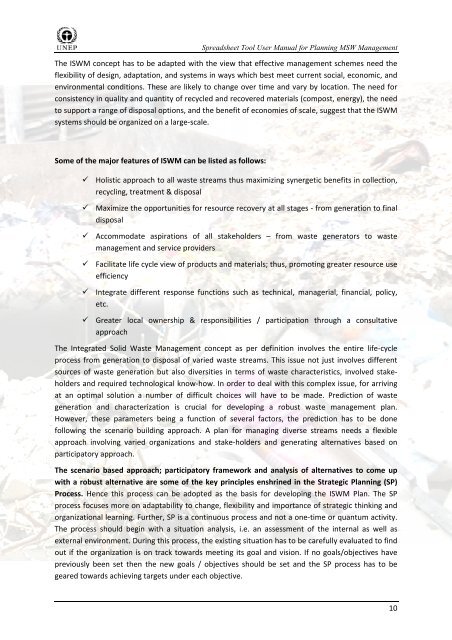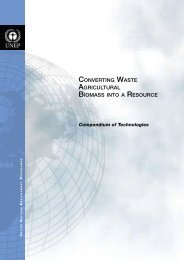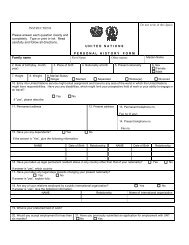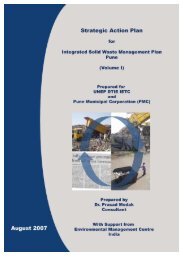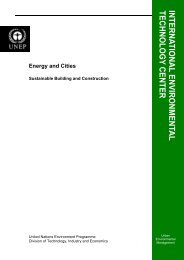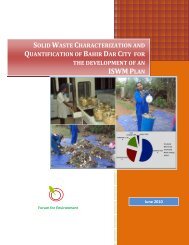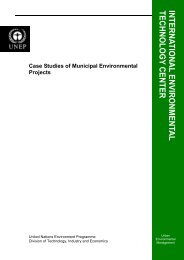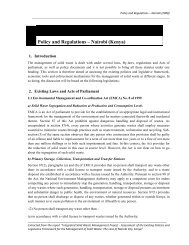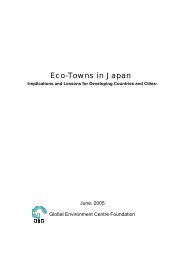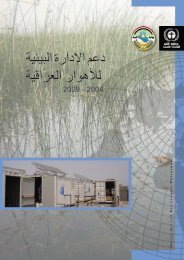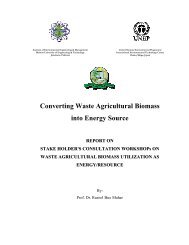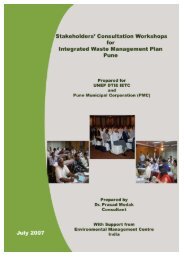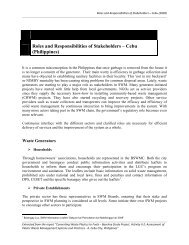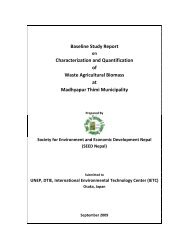Spreadsheet Tool User Manual for Planning MSW Management
Spreadsheet Tool User Manual for Planning MSW Management
Spreadsheet Tool User Manual for Planning MSW Management
You also want an ePaper? Increase the reach of your titles
YUMPU automatically turns print PDFs into web optimized ePapers that Google loves.
<strong>Spreadsheet</strong> <strong>Tool</strong> <strong>User</strong> <strong>Manual</strong> for <strong>Planning</strong> <strong>MSW</strong> <strong>Management</strong><br />
The ISWM concept has to be adapted with the view that effective management schemes need the<br />
flexibility of design, adaptation, and systems in ways which best meet current social, economic, and<br />
environmental conditions. These are likely to change over time and vary by location. The need for<br />
consistency in quality and quantity of recycled and recovered materials (compost, energy), the need<br />
to support a range of disposal options, and the benefit of economies of scale, suggest that the ISWM<br />
systems should be organized on a large‐scale.<br />
Some of the major features of ISWM can be listed as follows:<br />
Holistic approach to all waste streams thus maximizing synergetic benefits in collection,<br />
recycling, treatment & disposal<br />
Maximize the opportunities for resource recovery at all stages ‐ from generation to final<br />
disposal<br />
Accommodate aspirations of all stakeholders – from waste generators to waste<br />
management and service providers<br />
Facilitate life cycle view of products and materials; thus, promoting greater resource use<br />
efficiency<br />
Integrate different response functions such as technical, managerial, financial, policy,<br />
etc.<br />
Greater local ownership & responsibilities / participation through a consultative<br />
approach<br />
The Integrated Solid Waste <strong>Management</strong> concept as per definition involves the entire life‐cycle<br />
process from generation to disposal of varied waste streams. This issue not just involves different<br />
sources of waste generation but also diversities in terms of waste characteristics, involved stakeholders<br />
and required technological know‐how. In order to deal with this complex issue, for arriving<br />
at an optimal solution a number of difficult choices will have to be made. Prediction of waste<br />
generation and characterization is crucial for developing a robust waste management plan.<br />
However, these parameters being a function of several factors, the prediction has to be done<br />
following the scenario building approach. A plan for managing diverse streams needs a flexible<br />
approach involving varied organizations and stake‐holders and generating alternatives based on<br />
participatory approach.<br />
The scenario based approach; participatory framework and analysis of alternatives to come up<br />
with a robust alternative are some of the key principles enshrined in the Strategic <strong>Planning</strong> (SP)<br />
Process. Hence this process can be adopted as the basis for developing the ISWM Plan. The SP<br />
process focuses more on adaptability to change, flexibility and importance of strategic thinking and<br />
organizational learning. Further, SP is a continuous process and not a one‐time or quantum activity.<br />
The process should begin with a situation analysis, i.e. an assessment of the internal as well as<br />
external environment. During this process, the existing situation has to be carefully evaluated to find<br />
out if the organization is on track towards meeting its goal and vision. If no goals/objectives have<br />
previously been set then the new goals / objectives should be set and the SP process has to be<br />
geared towards achieving targets under each objective.<br />
10


